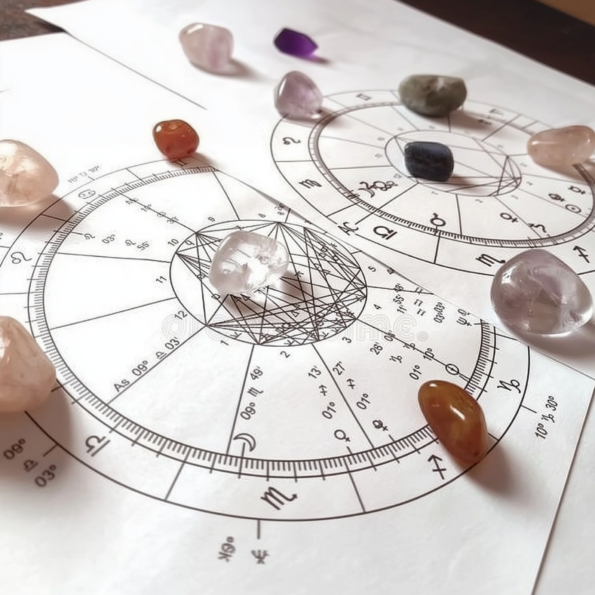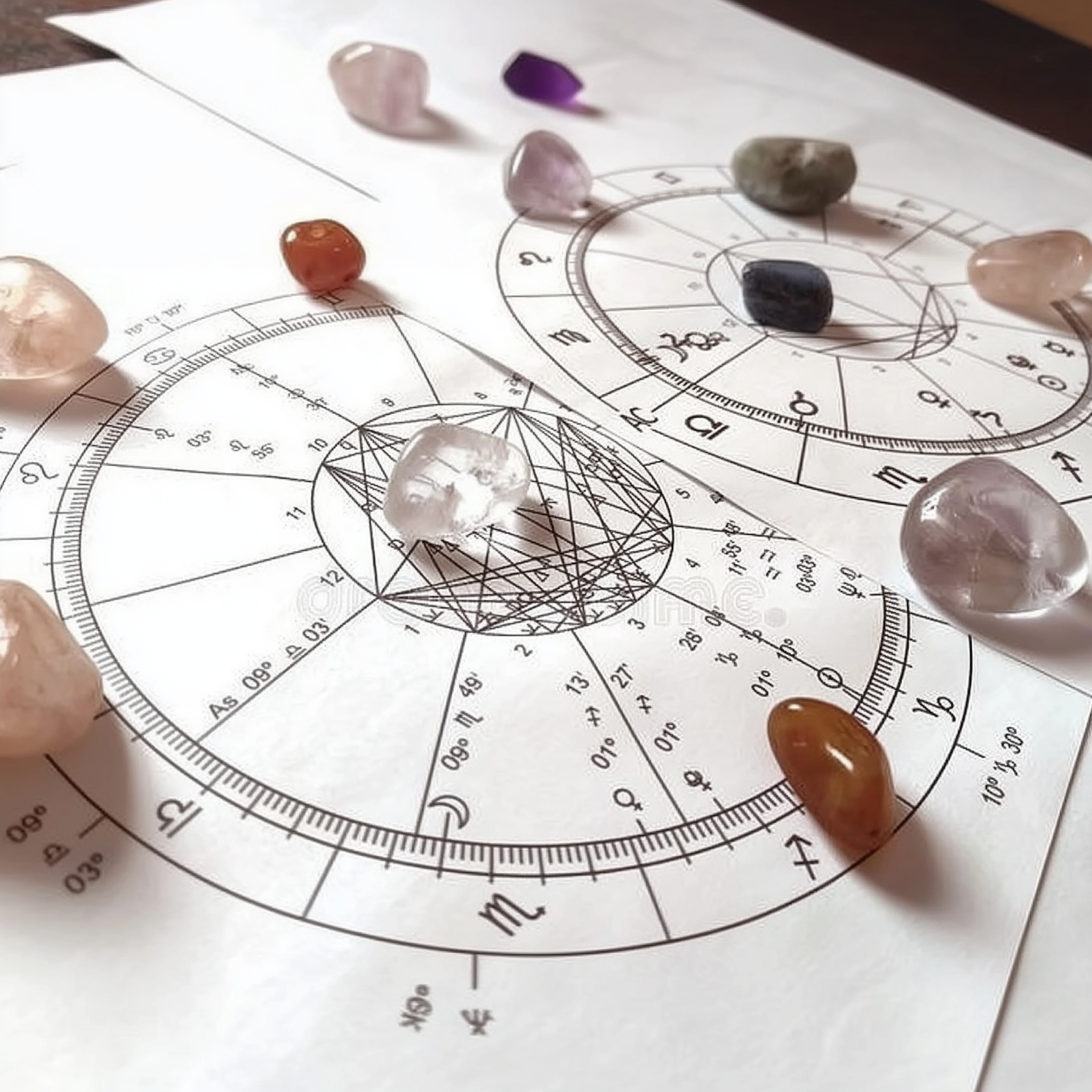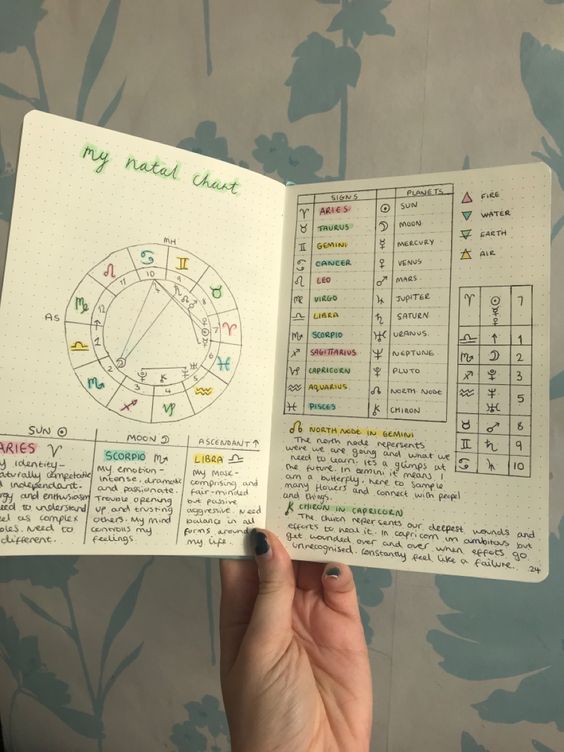 In astrology, the distribution of planets across the four hemispheres of a birth chart—Southern or Northern, and Eastern or Western halves—provides insights into your interaction with the external environment and your psychological orientation. Southern Hemisphere (Houses 7 to 12): Above the horizon lies the southern hemisphere, where houses seven through twelve bask in the light of day, representing your engagement with the world around you. If you have a majority of your planets here, it generally suggests that you’re an extroverted, outward-facing personality. You are deemed more objective because you are naturally inclined to engage with the world around you, focusing less on internal moods and feelings and more on external realities and social interaction. These houses describe how you connect with others, from personal relationships to societal roles. It’s about your interactions, collaborations, and the impact you have on the broader world.
In astrology, the distribution of planets across the four hemispheres of a birth chart—Southern or Northern, and Eastern or Western halves—provides insights into your interaction with the external environment and your psychological orientation. Southern Hemisphere (Houses 7 to 12): Above the horizon lies the southern hemisphere, where houses seven through twelve bask in the light of day, representing your engagement with the world around you. If you have a majority of your planets here, it generally suggests that you’re an extroverted, outward-facing personality. You are deemed more objective because you are naturally inclined to engage with the world around you, focusing less on internal moods and feelings and more on external realities and social interaction. These houses describe how you connect with others, from personal relationships to societal roles. It’s about your interactions, collaborations, and the impact you have on the broader world.
The World at Large
Meaning and fulfillment are sourced from relationships, societal roles, and public endeavors. Inner values and resources are expressed outwardly, shared with the world through your actions and interactions. Experiences from the public sphere—be they successes, failures, or simply everyday interactions—are often brought inward for analysis and integration. Here, you draw energy and meaning predominantly from your interactions with the world at large. Relationships, societal roles, and public life are central to your sense of purpose and fulfillment. The internal, private life serves more as a support system or a foundation from which to engage with the broader world. You’re compelled to express your inner values and energies outwardly, sharing them with others rather than keeping them confined to personal reflection.
Inward Looking Nature
Northern Hemisphere (Houses 1 to 6): If most planets are located here, it indicates that you have an introverted, inward-looking nature. These planets symbolize a life more oriented towards personal subjectivity, inner emotions, and private experiences. You might find your environment and daily happenings more personal and internally resonant. When the majority of your planets lie below this horizon, you are, in essence, a creature of the night, drawing strength from the depths of your inner world. You naturally turn inward, finding meaning and comfort in your inner life. Your power comes from within, and relationships and experiences that are deeply personal and intimate are your forte. You prefer close bonds and draw sustenance from your inner circle.
The first six houses are where you build your identity, values, and personal skills. Life here is about what happens within. It’s introspective, focused on your internal processes and how you perceive and react to the world around you. This hemisphere nurtures your core essence, shaping who you are at the deepest level. Even if you shine in the outer world, your soul’s sustenance comes from within. Experiences from the external world are internalized, processed within the depths of your psyche.
The horizon line in your birth chart is more than just a simple division; it’s a boundary between the outer world and the inner self, between public persona and private life.
Everything Intermingles
Houses ruled by planets positioned in the opposite hemisphere suggest that no one lives entirely within one realm or the other; there is always an exchange. For instance, someone with a 7th house (partnerships) emphasis but with a planetary ruler located in the 1st house (self, personal beginnings) might find that their personal identity and initiatives are deeply tied to their interactions with others. Both internal and external worlds are essential, but depending on one’s chart, one may serve as the primary lens through which life is interpreted and understood.
The Innie-Outie Paradox
You might have planets below the horizon, rooting you in subjective, personal realms, but if those planets are in signs known for their outward focus, like Sagittarius or Aquarius, you’re a curious blend of introspective and social. You could be a hermit who writes globally acclaimed novels, or an activist driven by deeply personal convictions. Astrology often contains such paradoxes, especially in the realm of hemispheres. It’s important not to interpret these too literally. A predominance in a particular hemisphere tells only part of the story; the signs these planets are in and the aspects they make to each other greatly modify how these energies manifest. For instance, the presence of many planets in emotional water signs could emphasize the subjectivity of planets below the horizon, making the person even more internally focused.
Eastern Hemisphere Dominance
Eastern Hemisphere (Houses 10 to 3): A predominance of planets in the eastern half of the chart empowers self-initiation and personal autonomy. You are typically proactive, initiating your own projects and decisions, and less influenced by external opinions. It empowers you to “run the show,” often manifesting as a personality that values independence and self-motivation. Your autonomy allows you to carve out your own path and make choices based more on personal preference and less on the expectations of others. You’re likely to take an active role in shaping your destiny and prefer to operate independently.
It suggests a strong sense of self-direction and personal agency, and you build your life according to your own blueprint. Your decisions, actions, and directions are forged by your own will and vision. You’re likely to march to the beat of your own drum, often pioneering new paths and setting trends rather than following them. Think of yourself as the bold explorer of your own life’s territory. Whether in career, relationships, or personal growth, you take the reins, initiating and leading rather than waiting for external cues.
Your self-defining orientation means that relationships, while important, are often viewed through the lens of personal needs and goals. You evaluate your connections based on how well you align with your personal aspirations and objectives. Controversially, some astrologers say that it is often easier for you to sever relationships that you perceive as unfulfilling or detrimental to your personal growth.
Your orientation is fundamentally subjective. You create your own reality, drawing from within to meet life’s challenges and opportunities. Relationships, no matter how significant, are viewed through the prism of your own needs and desires. Your internal compass guides your interactions and decisions. You find it easier to break free from relationships that don’t serve your personal needs. Your self-reliance empowers you to walk away from negativity or destructiveness without much hesitation.
Western Hemisphere (Houses 4 to 9): Here, the focus shifts to relationships and interactions with others. If you have many planets in the western hemisphere, you often find yourself more reactive to the influences and needs of others, suggesting a life that adjusts according to external circumstances and partnerships. Here, the theme is less about self-directed action and more about interaction and response to external stimuli. With this orientation, you may find that your actions and decisions are often influenced—or seemingly dictated—by the needs, desires, or expectations of others. It doesn’t mean a lack of freedom but indicates a life where personal choices are often intertwined with relational dynamics.
You may naturally gravitate towards professions that involve working closely with others. Fields such as teaching, psychology, medicine, and counseling are common, where success heavily relies on the ability to interact, understand, and respond to other people. You thrive on interaction and find fulfillment in shared goals. Your identity and sense of purpose are frequently mirrored through your interactions. You learn and grow through the feedback and experiences shared with others.
You tend to understand your identity and roles through your interactions and the expectations of those around you—be it family, partners, colleagues, or within your cultural or spiritual community. Your sense of self is primarily defined by your relationships. You see yourself through the lens of your connections and the roles you play within them. You thrive on these interconnections and derive meaning and fulfillment from them. Your individual identity outside of these relationships might feel unexplored or unfamiliar.
For Eastern Hemisphere Dominants:
Build Relationships: While your strength lies in self-reliance, consciously work on your relationships. Practice empathy and understanding, viewing connections not just as extensions of your needs but as mutual exchanges. Step outside your subjective comfort zone. Engage in activities that require collaboration and interdependence, allowing yourself to grow through relational experiences.
For Western Hemisphere Dominants:
Develop Self-Awareness: Develop a deeper understanding of your personal identity outside of your relationships. Spend time on self-reflection and personal pursuits that don’t solely rely on external validation. While valuing your connections, don’t be afraid to assert your individuality. Balance your relational focus with moments of independence and self-reliance.
Singleton
If a planet stands alone in a hemisphere (North, South, East, or West)—that planet can be a dominant influence in a person’s chart and life.
Personal Planets as Singletons (Sun, Moon, Mercury, Venus, Mars)
These planets represent core facets of your personality—your identity, emotions, communication style, values, and actions. When one of these is a singleton, it significantly shapes your approach to life. For instance, a singleton Sun could make your identity and self-expression particularly prominent, or a singleton Moon might highlight emotional processes and instinctual reactions as central themes.
Social Planets as Singletons (Jupiter, Saturn)
Jupiter and Saturn influence your social interactions, growth, and structure, respectively. A singleton Jupiter would amplify themes of expansion, optimism, and exploration, particularly in social areas. Your life is significantly shaped by your adventures, education, or philosophical pursuits. A singleton Saturn, on the other hand, might focus around discipline, responsibility, and challenges, often in a social or societal framework. It could reflect in a career that demands a high degree of organization, perseverance, and self-sufficiency.
Outer Planets as Singletons (Uranus, Neptune, Pluto)
These generational planets affect deeper, more collective or subconscious layers of your experience. Uranus as a singleton might lead to a life marked by sudden changes or radical shifts, pushing towards freedom and innovation. Neptune might focus a life around themes of spirituality, creativity, or selflessness, where the boundaries are often blurred. Pluto as a singleton can indicate a life shaped by transformations, power dynamics, or intense internal struggles. These energies can feel overwhelming and often out of your control because they operate on such a deep, often outer level. With an outer planet as a singleton, you might not feel in control of these forces. Instead, you often experience these energies as external pressures or fateful events that catalyze growth and change.
In any case, a singleton planet in a hemisphere commands attention in the natal chart, acting almost like a loudspeaker amplifying its themes throughout your life.
Overall, when considering hemispheres in astrology, it’s important to acknowledge that they generally involve a lot of generalization. However, if you have a stellium of planets in the 1st, 4th, 7th, or 10th house, these generalizations may be more applicable to you. Nonetheless, hemispheres can still hold some significance, serving as a broad factor to consider in an astrological chart.












